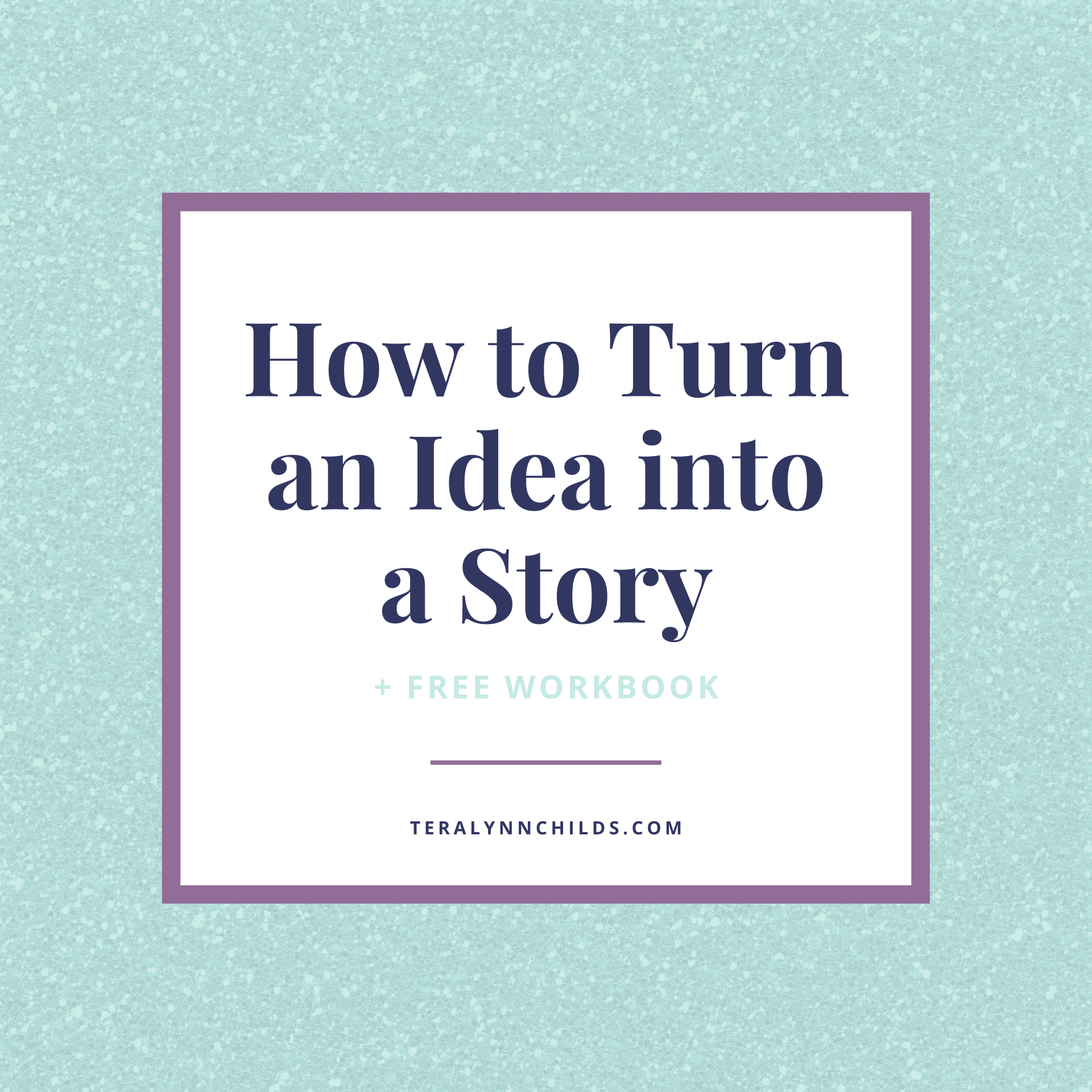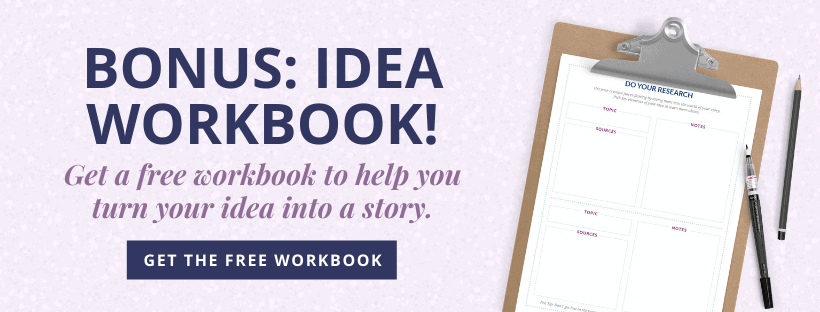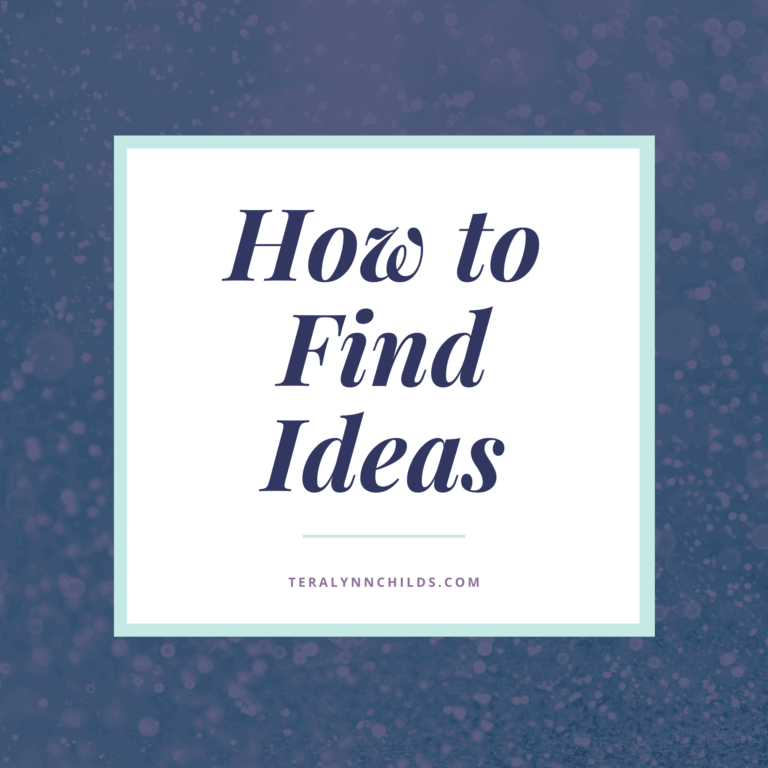How to Turn an Idea Into a Story
Every story ever written began with the same thing: an idea. The kernel. The seed. The spark. The inspiration. Whatever you call it, it all amounts to the same thing. All stories begin with a single idea.
But an idea does not make a story. When I got the first spark for Oh. My. Gods. all I had was the working title: Growing Up Godly. Forgive My Fins was born of the wish that a merman would emerge from the Gulf of Mexico and bestow his magical mer powers on me with a kiss. (Still waiting…) Sweet Venom was inspired by a feature on snake-themed accessories in a fashion magazine. In each of these cases, I had to take those tiny kernels and grow them into full-fledged stories.
At first it might seem daunting, but with practice and a few tricks to kickstart the creative juices, you’ll soon be an idea-into-story wizard. Ready to improve your game? Try these pre-writing methods on for size.
1. Brainstorm Like Mad
The first thing you need to do with the spark of an idea is add more ideas to it. The good news is that nothing exists in a vacuum. Ideas lead to more ideas, if you know how to play with them.
- Mind Mapping » Start with something you know, write it in the center of the page, and then surround it with all the things that might be associated with it. Then look at those associated things, pick the ones that stand out as most important and relevant, and then repeat the process.
- Make a List » Using only sentence fragments, write down everything you think might happen in your story. The key is to keep going after you think you’ve run out of ideas. Force your brain to keep going, even if things start getting ridiculous. Chances are you’ll push through the crazy into the truly juicy.
- Be a Journalist » Interview your idea, starting with the six key questions: Who? What? When? Where? Why? How? Who is in this story? What is happening? What needs to change? When and where does it take place? Why is it happening? Why is my character in this story? How is it going to be resolved?
- Get Active » When all else fails, move. Stand up and dance. Go for a walk. Clean your room. Do laundry. Get in the shower. Take a yoga class. While your conscious mind focuses on your body, your subconscious will be thinking about your idea. Don’t be surprised if answers show up out of nowhere.
Tailor your brainstorming to your personal preferences. If you’re really visual, break out the sticky notes and colored markers. If you’re musical, blast an inspiring playlist while you brainstorm. If you’re tactile, you might try index cards or a big whiteboard. Record your sessions in a voice memo. Talk it out with creative-minded friends. When it comes to brainstorming, there is no such thing as normal. Make it work for you.
2. Do Your Research
Many a great story element was born from research. Whether it’s finding out that the Roman emperor Justinian closed down Plato’s Academy or uncovering a rumor that fairies must spend one day each month in animal form, you never know where a trip down the research rabbit hole will lead.
Start with whatever you know about your story—location, time period, character jobs or hobbies, situations, anything—and add to your knowledge about those topics. Scour Wikipedia. Make Google do your dirty work. Walk through your setting in the street view in Google maps. Head to the nearest library.
Really dig into the nitty-gritty of that person, place, activity, or tidbit and keep your mind open for that bit of information that might be just what you need to kickstart your plot. Take lots of notes and bookmark everything—you never know when you’ll need that info later.
Just remember to pull yourself out when you’re using research as an excuse to procrastinate. Research to spark ideas? Good. Research to avoid actual writing? Not so much.
3. Meet Your Characters
Sometimes your characters hold all the answers. The more you know about the people who are going to populate your world and who are going to take action to change it (or prevent change), the more you’ll know about the story journey they’re about to go on.
Start with your protagonist, the main character in your story, and write down everything you know about her. Ask yourself or your character a series of questions to get her talking. What does she want? Why does she want it? What is she willing (and not willing) to do to achieve it? What does she like about herself, her life, and her world? What does she wish was different?
Once you’ve got her figured out (or if you’re having trouble getting a good picture of her) move on to other main characters. Who is the antagonist, the person most trying to stop your protagonist from achieving her goals? Does she have a love interest—or more than one? Who are her allies and enemies? Her friends? Her family?
The more you start to figure out the people who are going to take part in your story, to better idea you’ll have of what that story is going to be.
4. Ponder Your Plot
Whether you’re a pantser or a plotter or some combination of the two (raises hand) it always helps to know a little bit about what’s going to happen in your story before you start writing it. There are as many ways to get from opening to the end as there are writers on the planet, but almost every story is going to have some common elements.
- Ordinary World » The state of the story world on page one. Harry Potter lives under the stairs with his horrible aunt and uncle.
- Inciting Incident » Something happens to trigger change, to spark the protagonist to take action. Harry gets an invitation to attend Hogwarts.
- Obstacles + Reversals » The bulk of the story consists of the protagonist trying (and mostly failing) to achieve their goals, to make the changes that the inciting incident made inevitable. Harry struggles to fit in at Hogwarts, to learn how to use his magic, to protect his friends, to do what’s right, and to stay out of (too much) trouble.
- Final Battle » The biggest obstacle of all, one that will let the protagonist win (or lose) everything. Harry passes all the tests to defeat Voldemort/Quirrell and save the Sorcerer’s Stone.
- New Normal » The state of the story world after the protagonist’s journey. Harry leaves Hogwarts knowing that he’ll get to return after the summer.
Think about each of those story elements in terms of your idea. Maybe thinking about what might happen in your final battle or at your midpoint reversal will spark something in your plot or tell you something surprising about your characters.
Don’t feel like you have to know every step of your story in precise detail in order to start writing, but it’s always a good idea to have a least a potential ending in mind from the beginning.
And it’s always a good idea to leave yourself open to the possibility of something completely unexpected happening in the heat of the writing moment. Don’t ignore a spark of inspiration because it doesn’t fit your outline. When lightning strikes, abandon the plot and follow the story.
5. Just Start Writing
When all else fails, put words on the page. Sometimes, all the thinking in the world can’t find the answers you’re looking for. Whether it’s because you’ve made some missteps in your pre-writing or your brain is stuck in an idea rut, diving headfirst into the writing—maybe even before you feel ready—might be just what you need to shake things loose.
Some things you might try writing:
- Opening Scene » When, where, and how does your story start?
- Random Moment » Pick any scene that you think will happen in your story.
- Autobiography » Have characters write something about themselves.
- Dialogue Bits » Have two of your characters engage in a conversation.
- Cover Copy » The story summary that would be printed on the back cover.
- Synopsis » A much longer, scene-by-scene summary of your story.
These won’t necessarily end up in the final story, but they will get you in the groove of writing about these characters. Don’t be surprised if, once you start writing, you have a hard time stopping. Just keep going until you feel like you’re getting lost in the woods. Then it’s time to take a step back and look at what you’ve written to see what it tells you about your story.
Putting it to Work
You might find that some of these pre-writing techniques resonate with you more than others. Personally, I struggle with plotting a story if I’m not actually in the trenches writing it. But I love doing research and I find it really helpful to figure out as much about my characters as possible before I begin. You might feel the same, or maybe you’re the opposite.
When you’re first learning about your writing process, you should try as many different techniques and tactics as possible. You might be surprised by which ones work for you. Download my free workbook and put your current story idea to the test with all five of them.
I hope that you find at least one or two useful tricks to put in your pre-writing arsenal. And, more than anything, I hope that working through these methods inspires you to dive into writing your story. Because no matter how brilliant your idea, unless you put in the time and put words on the page, no one will ever know.
Do you have any favorite pre-writing techniques that I haven’t listed here? Share in the comments.







This is great advice!! I will definitely be using some of these techniques for my creative writing class next quarter! 🙂
Thanks Kat! Glad the workbook is proving useful. 🙂
Hy my name is Hannah! I’m 13 and i just wanted to tell you your Forgive my Fins series was the first series that got me into reading, and wanting to become a author! Your stories are so bright, girly and creative! I am definetly using your tips, and your right about brain-storming when your doing random things! 🙂 Do you have any tips on writing a novel on a computer?
Awwww! You are so sweet and I’m honored to have inspired you. My personal favorite tip for writing on a computer is to use Scrivener. It’s an amazing app that lets you collect research and notes and ideas all in one place. But barring that, any app/website/program that lets you get the words down is great. Anything from Google Docs to Evernote to plain old Microsoft Word. Whatever you do, make sure you have a way to tune out distractions. I use an app that shuts off my internet and I always have to have headphones/earbuds to control my sound environment. Hope that helps and GOOD LUCK!!
Hi! So I’m 13 and I’ve had a story Idea. Usually, I write them down but I don’t act upon them, but I have with this idea. I’ve written the Prologue and have planned 6 chapters out and I’m quite excited for it actually!!
Anyway, one thing I do when I have a story idea that I like, I write down the blurb for it and come up with the title at the very very VERY start. I don’t know if that helps or works for anyone else but it does for me 🙂
Also, how do you get covers? Do you know if I’d be allowed to make my own but with someone elses photograph because I’m not very sure about it
Writing the book blurb first is SUCH a good idea!!! It helps you nail the main point of the story so you can stay on track as you’re writing it.
As for covers, you can definitely make your own, but you have to make sure you only use pictures that you have a right to use. You can license a picture from a stock photo site like depositphotos.com, which is what I use, or you can grab some for totally free on sites like unsplash.com, pexels.com, or pixabay.com.
Okay, thank you!!
Thank you 🙂
Hi Tera, Everything you talk about makes so much sense! I have an epic idea for a story of sci-fi, realistic… in the sense that it could happen…! I’m from the great PACIFIC north west, and I’m a free spirit with a wild imagination, and all of a sudden I had an epiphany… the best idea for a story! I haven’t talked to anyone about it yet, and I’m not really a writer, but I am an artist in many forms! I was mainly looking for someone, specifically a woman’s perspective, to collaborate and talk With! And I was researching and I found you! I really believe this story could be amazing…! Hope you can get back to me… thanks so much ~ Jake
THIS IS SUPER GREAT ARTICLE, I’m working on a story right now, and THIS IS REALLY-REALLY HELPFUL, THANK YOU FOR THIS ARTICLE AND THE WORKBOOK!!!
Awesome!!! I’m so glad you found it helpful. Good luck with your story!